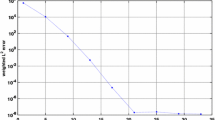Abstract
We confirm that the first-, second-, and third-order derivatives of fully-normalized Legendre polynomial (LP) and associated Legendre function (ALF) of arbitrary degree and order can be correctly evaluated by means of non-singular fixed-degree formulas (Bosch in Phys Chem Earth 25:655–659, 2000) in the ordinary IEEE754 arithmetic when the values of fully-normalized LP and ALF are obtained without underflow problems, for e.g., using the extended range arithmetic we recently developed (Fukushima in J Geod 86:271–285, 2012). Also, we notice the same correctness for the popular but singular fixed-order formulas unless (1) the order of differentiation is greater than the order of harmonics and (2) the point of evaluation is close to the poles. The new formulation using the fixed-order formulas runs at a negligible extra computational time, i.e., 3–5 % increase in computational time per single ALF when compared with the standard algorithm without the exponent extension. This enables a practical computation of low-order derivatives of spherical harmonics of arbitrary degree and order.
Similar content being viewed by others
References
Bosch W (2000) On the computation of derivatives of Legendre functions. Phys Chem Earth 25: 655–659
Fantino E, Casotto S (2009) Methods of harmonic synthesis for global geopotential models and their first-, second- and third-order gradients. J Geod 83: 595–619
Fukushima T (2012) Numerical computation of spherical harmonics of arbitrary degree and order by extending exponent of floating point numbers. J Geod 86: 271–285
Heiskanen WA, Moritz H (1967) Physical Geodesy. Freeman and Co, San Francisco
Holmes SA, Featherstone WE (2002a) A unified approach to the Clenshaw summation and the recursive computation of very high degree and order normalized associated Legendre functions. J Geod 76: 279–299
Holmes SA, Featherstone WE (2002b) Extending simplified high-degree synthesis methods to second latitudinal derivatives of geopotential. J Geod 76: 447–450
IEEE Computer Society (2008) IEEE standard for floating-point arithmetic. IEEE Std 754 rev
Jekeli C, Lee JK, Kwon JH (2007) On the computation and approximation of ultra-high-degree spherical harmonic series. J Geod 81: 603–615
Olver FWJ, Lozier DW, Boisvert RF, Clark, CW (eds) (2010) NIST Handbook of Mathematical Functions. Cambridge Univ Press, Cambridge. http://dlmf.nist.gov/
Pavlis NK, Holmes SA, Kenyon SC, Factor JK (2008) An Earth gravitational model to degree 2160: EGM2008. presented at the 2008 General Assembly of the European Geosciences Union, Vienna, Austria, April 13–18 2008. http://earth-info.nga.mil/GandG/wgs84/gravitymod/egm2008/index.html
Tscherning CC, Rapp RH, Goad C (1983) A comparison of methods for computing gravimetric quantities from high degree spherical harmonic expansions. Manuscr Geod 8: 249–272
Wenzel G (1998) Ultra-high degree geopotential models GPM98A, B, and C to degree 1800. Paper presented to the joint meeting of the International Gravity Commission and International Geoid Commission, 7–12 September, Trieste
Wittwer T, Klees R, Seitz K, Heck B (2008) Ultra-high degree spherical harmonic analysis and synthesis using extended-range arithmetic. J Geod 82: 223–229
Wolfram S (2003) The Mathematica Book, 5th ed. Wolfram Research Inc. Cambridge University, Cambridge
Author information
Authors and Affiliations
Corresponding author
Rights and permissions
About this article
Cite this article
Fukushima, T. Numerical computation of spherical harmonics of arbitrary degree and order by extending exponent of floating point numbers: II first-, second-, and third-order derivatives. J Geod 86, 1019–1028 (2012). https://doi.org/10.1007/s00190-012-0561-8
Received:
Accepted:
Published:
Issue Date:
DOI: https://doi.org/10.1007/s00190-012-0561-8




